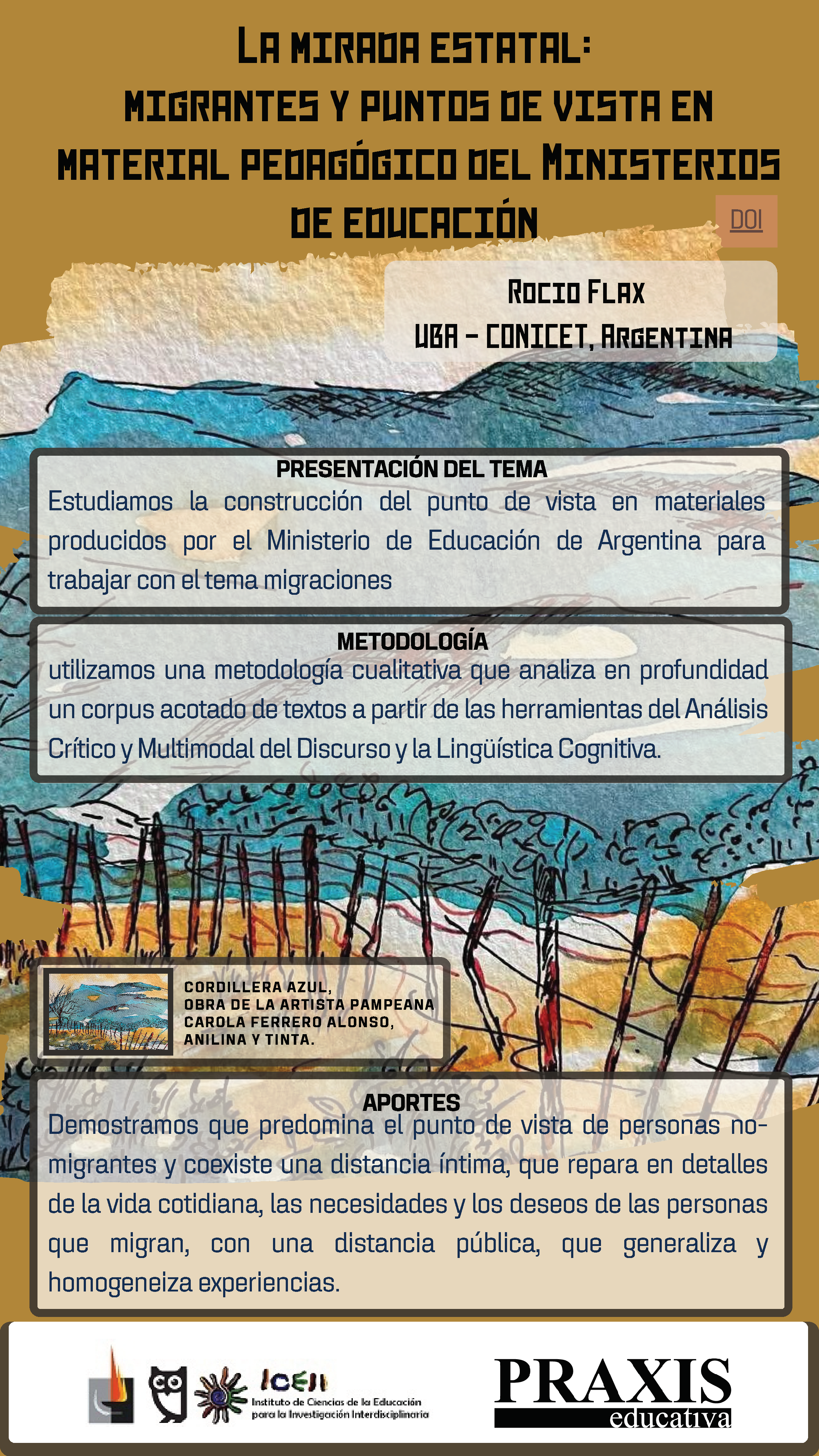The state perspective: migrants and points of view in pedagogical material by the Ministry of Education of the Argentine Republic
DOI:
https://doi.org/10.19137/praxiseducativa-2025-290122Keywords:
discourse analysis, pedagogical discourse, migrants, point of view, decolonial studiesAbstract
We analyze the construction of the point of view in materials produced by the Ministry of Education of Argentine regarding topics about migration. This study allowed us to investigate questions such as who are or who may be those that migrate, who can constitute as subject of knowledge and who is relegated to the position of object of knowledge, and from what distance and angle of vision (considering the axes of power and solidarity) they are observed and studied. We inscribe our research in Critical Discourse Analysis and use a qualitative methodology that analyzes an extensive limited corpus. Among the results obtained, we highlight that the point of view of non-migrants predominates and an intimate distance coexists, which involves details of daily life, needs and desires of people who migrate, with a public distance. This generalizes and homogenizes experiences. Through these devices, the presence of migrant students in Argentine schools is made invisible. Keywords: discourse analysis; pedagogical discourse; migrants; point of view; decolonial studies
Downloads
References
Avallone, G. y Molinero Gerbeau, Y. (2021). Liberar las migraciones: la contribución de Abdelmalek Sayad a
una epistemología migrantecéntrica. Migraciones internacionales, 12, 1-28.
Bottazzi, F. y Di Tondo, F. (2021). La conservación de textos escolares: entre el afecto y la institucionalización:
El caso de la Biblioteca del Docente. El Toldo de Astier, 12(23), 78-89.
Castro-Gómez, S. y Grosfoguel, R. (2007). El giro decolonial: reflexiones para una diversidad epistémica más
allá del capitalismo global. Siglo del Hombre Editores.
Cuenca, M. y Hilferty, J. (1999). Introducción a la lingüística cognitiva. Planeta.
Dvoskin, G. (2024). Entre la reproducción de contenidos y la formación crítica: un análisis crítico discursivo de
las interacciones áulicas en la Ciudad de Buenos Aires. Praxis Educativa, 28(2), 1-17.
Fairclough, N. (1992). Discourse and Social Change. Polity Press.
Fairclough, N. (2003). Analysing Discourse. Textual Analysis for Social Research. Routledge.
Flax, R. (2024a). “¿Cómo creen que se sentirían ustedes si tuvieran que irse a vivir a otro país?” Invisibilización
de les estudiantes migrantes en los manuales oficiales de argentina. Revista Rasal Lingüística, 2024(2).
Flax, R. (2024b). La representación de migrantes en manuales escolares de literatura: entre el silencio, el fracaso
y la nostalgia. Revista de Educación, 31(2), 195-227.
Flax, R. y Forte, D. (2022). Semiótica social y multimodalidad. Herramientas para el análisis de textos.
Editorial Tres más uno.
Foucault, M. (1996) [1978]. La verdad y las formas jurídicas. Gedisa.
Gil Araujo, S. (2010). Una sociología (de las migraciones) para la resistencia. Empiria. Revista de Metodología
de Ciencias Sociales, 19, 235-249.
Hart, C. (2010). Critical Discourse Analysis and Cognitive Science. New Perspectives on Immigration
Discourse. Palgrave Macmillan.
Hart, C. (2014). Discourse, Grammar and Ideology. Bloomsbury.
Hart, C. (2015). Viewpoint in linguistic discourse. Critical Discourse Studies, 12(3), 238-260.
Heiss, S. y Herzog, B. (2021). Invisibilization of Coloniality. The Control of Being, Knowledge and Power.
International and Multidisciplinary Journal of Social Sciences, 10(1), 52-80.
Ibarretxe-Antuñano, I. y Valenzuela Manzanares, J. (2023). Lenguaje y cognición. Editorial Sintésis.
Kress, G. y van Leeuwen, T. (2006). Reading images. The grammar of visual design. Routledge.
Lakoff, G. (1987). Women, fire and dangerous things. The University of Chicago Press.
Langacker, R. (2008). Cognitive grammar: A basic introduction. Oxford University Press.
Lizcano, E. (2006). Metáforas que nos piensan. Sobre ciencia, democracia y otras poderosas ficciones. Editorial
Traficantes de Sueños.
Raiter, A. (2016). Representaciones sociales. En A. Raiter y J. Zullo (Comps.), Al filo de la lengua. Medios,
publicidad y política (pp. 15-36). Ediciones La Bicicleta.
Sayad, A. (1984). État, nation et immigration: l’ordre national à l’épreuve de l’immigration. Peuples
méditerranéens, 27-28, 187-205.
Segato, R. (2006). Racismo, discriminación y acciones afirmativas: herramientas conceptuales. Série
Antropología, 404.
Segato, R. (2007). La nación y sus otros: raza, etnicidad y diversidad religiosa en tiempos de políticas de la
identidad. Prometeo Libros.
Van Leeuwen, T. (2008). Discourse and Practice. New Tools for Critical Discourse Analysis. Oxford University
Press.
Verón, E. (1998). Lo ideológico y la cientificidad. En La semiosis social. Gedisa.

Published
Issue
Section
License
Copyright (c) 2025 Rocío Flax

This work is licensed under a Creative Commons Attribution-NonCommercial-ShareAlike 4.0 International License.
Copyright Notice
Editorial Committee Educational Praxis Magazine:
I hereby declare that I am the author of the article titled (article name), that it is original and my own and that it was not previously published in any other format or medium. I declare to know that the magazine will not charge me any type of fee under any circumstances, nor will I receive any type of monetary compensation If it were accepted for publication in Educational Praxis, I authorize the aforementioned magazine to publish it digitally and to advertise it on its social networks.
If the work is published, I adhere to the Creative Commons license called "Attribution - Non-Commercial Share Alike CC BY-NC-SA", through which it is allowed to copy, reproduce, distribute, publicly communicate the work and generate derivative works, as long as when the original author is cited and acknowledged. This license has been used since September 2018. In 2016 CC BY NC ND 4.0 was adhered to; and in the years 2017 and 2018 (January-August) CC BY NC 4.0.
This CC BY-NC-SA Share Alike license does not, however, permit commercial use of the work. As an author, the journal may establish additional agreements for the non-exclusive distribution of the version of the work published in the journal, it allows me to self-archive the published articles, in their post-print version, in institutional, thematic repositories, personal web pages or any other relevant use. with the recognition of having been first published in this journal.
Educational Praxis adheres to DORA (Declaration on Research Assessment) signed in San Francisco, California, on December 16, 2012, and to the Declaration of Mexico (Joint Declaration LATINDEX - REDALYC - CLACSO - IBICT).














_(1)2.png)


3.png)











_(2).png)






2.jpg)









